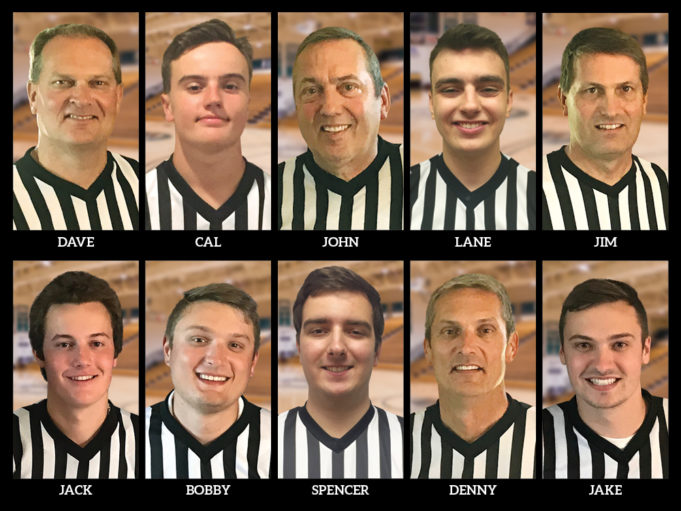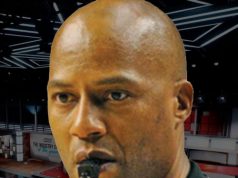I t’s ten basketball officials, one family as Cal Von Rueden, 15, recently joined the ranks of this basketball officiating dynasty in the greater Milwaukee area — four fathers and six sons.
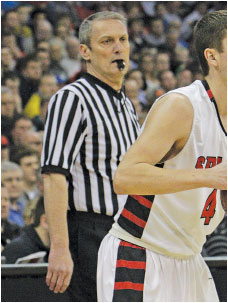
Jim Von Rueden, 57, started the party almost 40 years ago. His college roommate’s father was a big-time D-I college official, as was his roommate at St. Norbert College. When his roommate needed a partner to do some local grade school games, Jim stepped up. From there, he moved to intramurals. The Von Ruedens were off and running. Almost 40 years later, Jim now officiates a full high school varsity schedule, including several trips to Madison for the state championship. “My goal was always to referee a game in Madison and that dream was realized in 2006,” said Jim.
Jim’s brother Denny, 52, got in from a slightly different direction. As a scorekeeper for a local league, he saw a regular rotation of five officials come in to do the games and thought to himself, “Why not start reffing?” So he did, beginning with 5th and 6th graders and working his way up through youth ball.
“It was hard to move up to varsity back then. The partner of a guy I knew got hurt and that gave me an opportunity, and he asked me to work with him,” said Denny. “That’s how I got to do varsity games when I was 22. I’ve had a couple of different partners since then.”
Denny continues to officiate a full high school varsity schedule and has been to the state tournament several times.
Denny and Jim look back on those early years, along with their two other officiating brothers, Dave, 56, and John, 58, and recognize how much more difficult it was to get a varsity opportunity starting out. Girls’ basketball was just beginning as Title IX had been implemented in the mid-1970s. Because two-person crews were utilized and there were fewer schools in southeast Wisconsin, fewer officials were needed.
“We didn’t have the number of schools 30 years ago that we have now. Adding a third ref in boys’ and girls’ games has also helped open up opportunities. Today it’s easier to break in varsity officials at an earlier age,” Denny explained.
Some of those officials will come from the Von Rueden clan. Bobby, one of Denny’s three sons (the others are Jake, 20, and Greg, who passed away four years ago from cancer) is the furthest along. Currently a senior at Marquette University in Milwaukee, he will graduate this spring with a degree in accounting and information technology, and begin a full-time job at PricewaterhouseCoopers where he interned last summer. He’s been on track with high school varsity assignments since graduating from high school. His cousins, Spencer, 21, and Lane, 18, are Mike’s sons (Mike does not officiate). Two other cousins come from another non-officiating Von Rueden — Mark (his sons are Cal, mentioned above, and Jack, 17).
As Denny, Jim and Bobby all point out, Bobby has a bit of a built-in advantage staying in the Milwaukee area for college: He gets to keep officiating there. That means a full schedule, more exposure in officiating and direct feedback from his family. His cousins return home to work summer ball, so they don’t get the same amount of exposure while they are away during the school year.
Bobby played basketball up to the JV level at Marquette University High School (Milwaukee). When Bobby got cut, Denny suggested Bobby take a look at officiating as an alternative. That led to some grade school games and by his junior and senior year in high school, he officiated occasional 16-/17-year-old AAU ball, though most of his schedule was at the 7th and 8th grade level.
“While in high school, I did get to ref a few 9th grade games. During my first year in college, I officiated 18 high school games. I’ve had a full varsity schedule ever since,” said Bobby.
He went to a lot of his dad Denny’s games when he was growing up. It wasn’t that he was seeking to become an official. Instead, he remembers picking some of the better games, getting set up with a group of people by Denny, then “wandering around” and enjoying the basketball atmosphere. “I didn’t pay attention to the crowd the way I would now,” he laughed.
Jim’s son Matt officiated intramurals for a while when he attended Marquette University High School. “He would often get assigned to work the center court because he wouldn’t take any crap,” Jim laughed. Matt also worked some summer league games, but told his father he didn’t want to continue officiating so he could spend more time with his family. So the family officiating bug bit 11, but only infected 10.
No Daughters?
One might look at the Von Rueden family and ask, “Where are the daughters?” Not having a Von Rueden daughter officiating isn’t due to a lack of trying on the fathers’ part. Jim has three daughters, and two indicated an interest in officiating.
In high school, Jim’s girls played field hockey, a sport desperate for more officials. The three young women (two now are in college) are in Oklahoma, North Carolina and Stevens Point, Wis. “Time commitments and locations with limited transportation would make it difficult for them to officiate,” Jim admitted. “If they were here, two of them said they’d officiate because they love the game.”
Becoming a Von Rueden basketball official also requires a certain knowledge of the game, and none of Jim’s daughters went that route. They played some softball, but their real passion in high school was music.
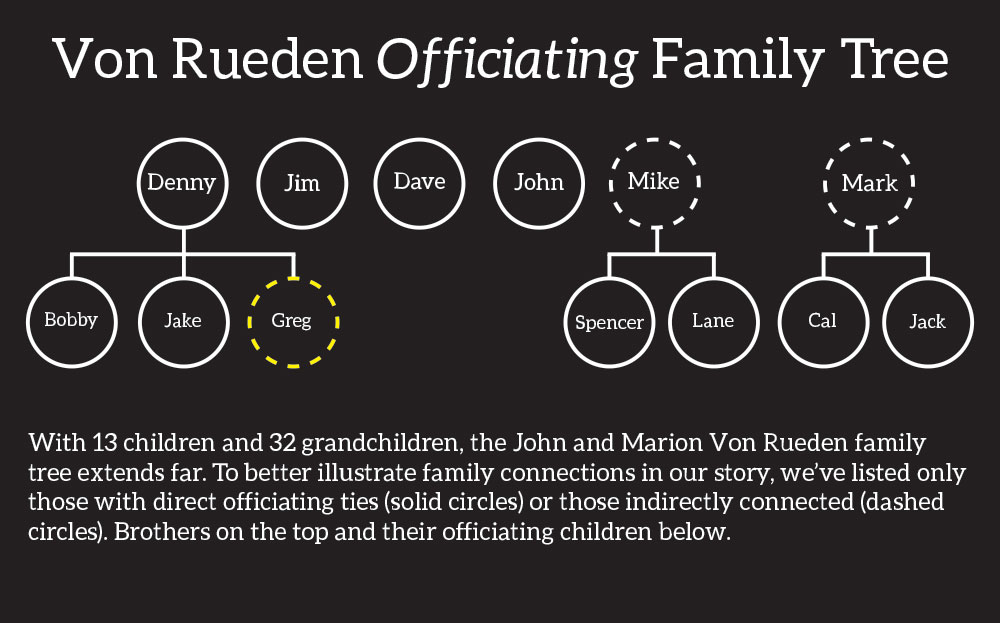 Keeping the Next Generation Engaged
Keeping the Next Generation Engaged
The Von Rueden men want the next generation to succeed. They’re thinking about how to succeed as an official, how to bring younger officials into the sport and how to retain them. These are issues faced around the country (and in some cases the world), not just in basketball, but in all sports.
Jim finds it particularly important to let younger officials know when they do a good job and goes out of his way to show support. “The younger kids — we have to stay positive with them. If they want to continue, we have to find out why they want to get involved,” Jim says. “It was never a fit for my girls, but we have to figure out why younger kids want to officiate.”
“I have always liked officiating. But making money is also a reason to officiate,” Denny added.
“I think the hardest thing for new officials is the criticism they take,” Jim continued. He cited an example of going to a youth baseball game and watching a younger umpire around 14 or 15 years old being verbally harassed by a middle-aged man in the stands. “He’s yelling at this young kid umpiring.”
“Think about what that does to the kid’s confidence level,” Denny interjected. “Officiating teaches you skill sets for life. You learn how to deal with adults.”
Jim sees managing the game as the key skill that the next generation should learn. “Don’t worry about messing up a call. Understand how to manage the mess. If you have two young officials on the game, one of them better know how to manage the game effectively,” he explains.
Denny likes giving pointers and positive feedback to beginner officials to keep them upbeat.
Jim emphasizes that beginning officials stick to the parameters of the rules.
During his first varsity contest at a high school in West Bend, Wis., Jim remembers kicking his first call. It was the opening tip and the ball moved quickly from one side of the court to another and he blew his whistle immediately, ruling a violation for “moving around the circle.” At halftime, he apologized to his partner, who responded, “Ha, that’s fine. If the coach is out of control, hit him with a T before halftime and get it over with.”
Jim used that example to demonstrate to younger officials the importance of understanding your partners and being on the same page as a team.
“That’s the hard part — how you fit together,” he said.
These lessons that Jim and Denny share with the younger generation of Von Ruedens prepare them for the evolution of the game, improve their play-calling abilities, and ultimately refine how they deal with life in general.
Father-Son
Bobby recognizes he has one advantage over other basketball officials — being able to go to his dad or uncles or officiating with them. Officials develop a comfort zone with their favorite partners over time. With a family member, he feels an immediate bond. “I have good opportunities to talk with my dad and uncles. They will tell me things that others might not. They’re harder on me, too, which is good, because it helps me get better,” Bobby explained.
In certain situations, for example, he may find he missed a play. Jim or Denny may tell him something specific to think about so he’s prepared the next time. Bobby believes that type of advice helped him advance to a varsity schedule faster. “I was doing varsity before some other guys because of the situations I was put in. That’s an advantage getting started,” he said.
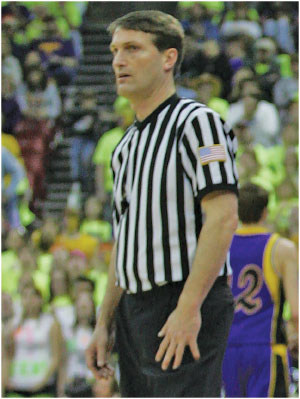
“My friends became Bobby’s friends,” Denny added, pointing out the joys of bringing his son into the officiating fold. “If Bobby was open and we needed a partner, we’d bring him along. Jimmy and I are well known in officiating circles for this area, so that benefitted Bobby, too. He’s also performed well, so he’s demonstrated to supervisors that he can do the job. He’s probably had more commissioners watch him than other guys have had. That’s helped open doors.”
“All the people around us in reffing circles help Bobby and his cousins,” Jim continued. “They get good advice from a lot of different people. They get a lot of opportunities to ask questions, listen and hear good information. They may not agree with all of it, but just listening helps,” he said.
“The reputation of Jimmy’s crews may have hurt me,” Denny laughed, poking fun at his brother. The reality is that the two often get mistaken for each other and could almost be mistaken for twins. That misrepresentation has both hurt and helped them depending on the coach or the situation in the game. That same mistake sometimes affects Bobby and his cousins.
Bobby also pointed out that he gets the opportunity to discuss issues with coaches because of the road paved by his dad and uncles, an opportunity not always available to most young officials.
First Game Together
The first game that Bobby, Jim and Denny worked as a crew together was three years ago at South Milwaukee High School. They agreed the result was positive. “Jimmy and I had worked together plenty, so the excitement to work with him again wasn’t that great,” Denny laughed. Adding Bobby to the crew raised their collective enjoyment level, and Denny is now looking forward to working with his sons Jake and Bobby down the road.
“We had three good officials on the court,” Jim said of that first game together. “That made it more fun and gives you confidence. We know how each other officiate. There’s a comfort level you have with anyone who officiates at a similar level to yourself.”
“You get put with any particular set of guys and be comfortable if you have the same level of play calling,” Denny agreed. “You don’t have to worry about what they’re going to call.”
“I think having the three of us on the court together relaxes coaches a bit,” Bobby added. “For me, it was more about the experience than reffing the game.
“I had a playoff game at Slinger High School and the coach asked if I was Jim’s son. I said, ‘No, Denny’s.’ Being able to talk with coaches about non-basketball stuff helps humanize us as referees. We’re no longer just the ‘refs’ in certain situations,” Bobby continued.
“Then the coaches will yell at you,” Denny said humorously.
The Yellow Whistle for Greg
When you drive up to Denny Von Rueden’s house, one of the things you see is a yellow poster in the window across the street that reads, “Yellow for Greg.” The sign, which was originally created by a neighbor, stays up in remembrance of Greg Von Rueden, who passed from cancer at age 15. Four years ago, the Wisconsin Basketball Officials Association (WBOA) board members came together to give back to the Make-a-Wish Foundation.
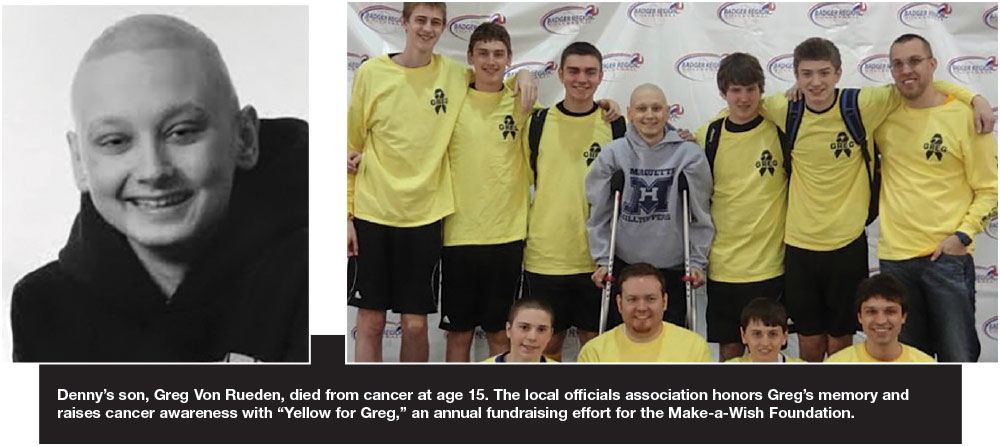 The fundraising was a success, and the WBOA kept the effort going annually in memory of Greg to help one family each year get its “Make-a-Wish” dream for their child.
The fundraising was a success, and the WBOA kept the effort going annually in memory of Greg to help one family each year get its “Make-a-Wish” dream for their child.
“We’ve done it now (the fundraising by WBOA) for four years. The first was a month after Greg died and the board members put it together very fast,” Denny said. The effort, similar to the pink whistle seen on TV during cancer awareness week, was termed “Yellow Whistles for Greg,” in honor of Greg and his battle.
For the WBOA program, the goal is to raise $9,000 annually for the needs of one child and his or her family through the Make-a-Wish Foundation. Officials were originally encouraged to donate a game fee, but any contribution is appreciated. Yellow whistles are given by WBOA to officials in their association, and the Wisconsin Interscholastic Athletic Association (WIAA) allows the whistles to be worn for four days. Public address announcers at the high school games are asked to promote the cause.
Jim remembers taking a photo of a banner for Greg at a game in Racine. Over the years, the effort has spread farther and wider from Denny’s hometown of New Berlin.
“I was at Mukwonago for a game and they were doing a presentation for Make-a-Wish. They wanted to do a presentation because I was working the game that night. It was nice and leaves you at a loss for words,” said Denny. “The outreach to our family on Greg’s struggle has been unbelievable. It’s been all over the country, even on social media. The day he died, it was the number-one trending item on Twitter. It’s amazing how many people got behind a 15-year-old kid.”
Denny believes in the importance of remembering Greg and recognizing that every family has its ups and downs. “Almost everyone has cancer in their family. The amount of people supporting our message is powerful,” he said.
“Denny has handled it with class. There are so many emotions. The positive impact on so many people has been fantastic,” Jim added.
“It’s been really good because talking about Greg and his unfortunate death is healthy,” Denny said. “In the old days, you’d sweep it under the rug and not talk about it. There are a lot of lessons from this like praying as a community and sticking together as a family. He’s helped a lot of people. We are so blessed by the referee family and the community at large. It’s unfortunate he got cancer and died.”
The Von Ruedens’ blessings go deeper than that. They have supportive family members on and off the court. They grow from each other. And they’ve learned many lessons from the court that can be applied in life.
“I felt I had a lot of success in internships and job interviews as a result of officiating,” said Bobby. “It gave me numerous examples where I had to manage difficult situations involving players, coaches and even other officials. The life skills off officiating go far beyond the court.”
What's Your Call? Leave a Comment:
Note: This article is archival in nature. Rules, interpretations, mechanics, philosophies and other information may or may not be correct for the current year.
This article is the copyright of ©Referee Enterprises, Inc., and may not be republished in whole or in part online, in print or in any capacity without expressed written permission from Referee. The article is made available for educational use by individuals.

